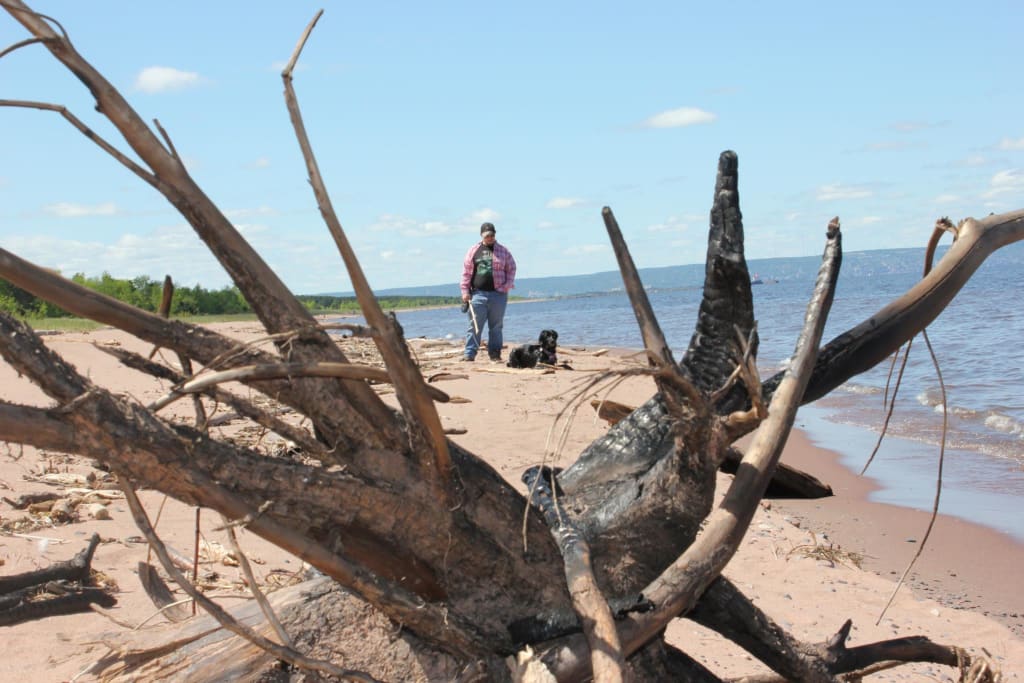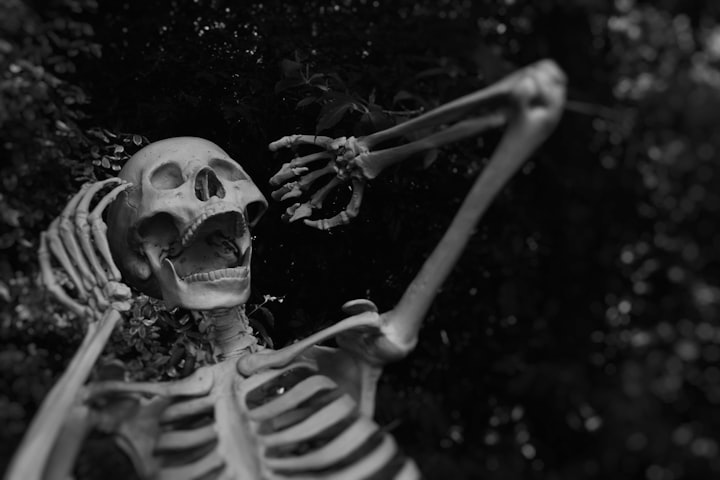What's Wrong With Your Dog?
He loved too hard, lived too big, and was my best bud.

“What is wrong with your dog?”
I kind of knew the question was coming. Gideon and I had been standing on the beach, watching a grizzled, sturdy gentleman throw a stick into the lapping waves of Lake Superior, only to have his beautiful white pitbull crash through the waves and swim out to joyfully retrieve it. She shook water in all directions as she reached the sand and dropped the stick, and she would occasionally glance at me and Gideon as if to ask if we wanted to play.
Gideon wanted to play. He desperately, anxiously wanted to play. His sole purpose in life was to make friends. It didn’t matter what the friend looked like - another dog, a human, a seagull, sometimes even the weird beetle walking along the beach at Wisconsin Point - he just wanted to be friends. His desperately wagging tail gave him away and the pitbull started to veer our direction, only to have her human call her back.
“Olivia, come. Here.” The man’s accent was heavy and reminiscent of Eastern Europe. He threw the stick out into the lake again, and Olivia again crashed through the waves after it. Gideon sidestepped back and forth anxiously, watching carefully, seeming sure the lake was going to swallow the potential friend, but she nonchalantly swam back to shore.
“He can’t swim,” I responded.
“What you mean he can’t swim?” the man asked. It was a curious question, not a harsh one, and a fair question. Gideon was, on the surface, the ideal example of a flat-coated retriever. His breed was all but designed for the water. In a different life, he might have been right alongside Olivia, joyfully running into the lake.
In a different life, he wouldn’t have been in a shelter after four and a half years in an abusive home. He wouldn’t have had a hump in his back from living in a crate too small for him when I adopted him. It was hard to see those things in him now, years later, as he worriedly scanned the water.
“He’s afraid of the water,” I explained. “He always has been. He doesn’t even like being in the bathtub. He’ll wade to his knees if the water is calm, but that’s it.”
“It’s very strange,” the man commented. “Olivia cannot get enough of the water. She would do this all day. A very good swimmer.”
I just smiled in response; it felt awkward to try to explain my dog’s mental health background to a stranger on the beach. Gideon was starting to whimper watching Olivia in the waves. “It’s okay, Bud,” I told him. I knelt down beside him to give him a hug. “She’s safe. She’s having fun.” As I spoke, Olivia ran out of the waves again.
I gave a small wave to the gentleman and continued down the beach with Gideon, trying to direct him to some of his favorite spots. He was afraid of the water, but he loved the beach - running along long stretches of sand, play dates with other dogs belonging to my classmates and professors, digging seemingly endless holes and still only finding sand.
As we walked, the man’s words reminded me of the first time someone had asked me what was wrong with Gideon.
“What the f*** is wrong with your dog?”
My youngest brother was standing in the doorway to the spare room he was staying in while he lived with us. Gideon was on his third trip down the hallway; long and narrow, like many trailer homes had, it started in the living room and ended at a back bedroom that was serving as my office. My office door was open, and Gideon had a straight shot as he barreled down the hallway, threw himself against the far wall of my office, and rolled frantically against the baseboard before getting up, dashing back down the hall, and doing it again.
We hadn’t had Gideon long at that point, but this quirk had developed not more than a couple of weeks after we brought him home. By the time my brother had moved in with us, Gideon was a pro at it, to the extent one could be a pro at running down the hall and throwing themself into the wall.
I shrugged. “It’s a thing he does. He’s not hurting anything. He’s never hurt himself and he seems to like doing it.”
I was familiar with “zoomies,” but this was not quite anything like zoomies I’d seen before. I suspected it had to do with the anxiety issues he’d come home to us with, but the shelter had little exact information about him; his age of four and a half years was only a rough estimate. He was definitely an adult, and the hump in his back told more of the tale of his previous housing than he ever did outwardly to us. I didn’t know it at the time, but the hump would gradually straighten out over the years and be completely gone by the time he passed away at 14. It didn’t deter the enthusiastic energy he brought to his life with us.
“There’s something wrong with that dog.” My brother shook his head in disbelief.
The sun was hitting the tops of the waves and starting to lean to the west when Gideon and I turned around to head back to the car. He held his head high, eagerly scanning the beach for more friends, more fun and interesting things to do, and anything that might seem exciting. These walks on the beach became a staple while we lived in Superior, and each one was different while feeling the same. They were a lot like my dog - different from other dogs, certainly, “something wrong with him” in the eyes of some, but very much the same loving companion as many others.







Comments
There are no comments for this story
Be the first to respond and start the conversation.